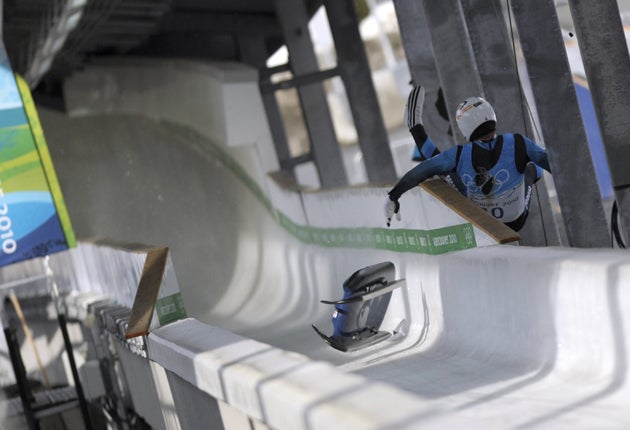Athlete killed on Olympics course
Georgian luge competitor collides with unpadded steel column after leaving track on notorious final bend

Your support helps us to tell the story
From reproductive rights to climate change to Big Tech, The Independent is on the ground when the story is developing. Whether it's investigating the financials of Elon Musk's pro-Trump PAC or producing our latest documentary, 'The A Word', which shines a light on the American women fighting for reproductive rights, we know how important it is to parse out the facts from the messaging.
At such a critical moment in US history, we need reporters on the ground. Your donation allows us to keep sending journalists to speak to both sides of the story.
The Independent is trusted by Americans across the entire political spectrum. And unlike many other quality news outlets, we choose not to lock Americans out of our reporting and analysis with paywalls. We believe quality journalism should be available to everyone, paid for by those who can afford it.
Your support makes all the difference.Just hours before last night's opening ceremony began in Vancouver, the Winter Olympics was dealt a devastating blow when a Georgian athlete was killed during a luge training run at the controversial Whistler Sliding Center.
Nodar Kumaritashvili, 21, lost control of his sled and was thrown off the track into an unpadded steel pole near the finish line. He was given emergency resuscitation treatment before being airlifted to hospital where he later died.
Jacques Rogge, president of the International Olympic Committee, said that the death "clearly casts a shadow over these games." Ahead of the opening ceremony no announcement had been made as to whether the events at the Sliding Center would go ahead as scheduled. The luge men's singles is due to begin tonight. Training was suspended after the incident and representatives from the competing nations were last night meeting to decide what course of action to take. Britain has one athlete, Adam Rosen, due to take part.
Irakly Japaridze, the head of the Georgian Olympic delegation, said: "We are all in deep shock, we don't know what to do. We don't know whether to take part in the opening ceremony or even the Olympic Games themselves."
The local organising committee released a statement saying that an investigation was under way to "ensure a safe field of play." But they will come in for heavy criticism.
The Sliding Center already had a notorious reputation for speed. It is the fastest track in the world with competitors reaching up to 90mph. The 16th and final bend, where the accident happened, had been identified as a particular worry. The amount of practice time given over to competitors ahead of the Games has also caused concern among some National Olympic Committees. The host nation's athletes have been given preference.
The track is due to host the bobsleigh and skeleton as well, events in which Britain has strong medal contenders in the world champion bobsleighers, Nicola Minichiello and Gillian Cooke, and Shelley Rudman and her partner Kristan Bromley in the skeleton.
Fears of the prospect of serious injury had been raised before yesterday's fatality. After his first training run, Rosen, who dislocated his hip on the same course in October, said: "You have to be very exact on certain parts of the track otherwise they could be disastrous." British skeleton's performance director, Andi Schmid, had expressed prescient concern before the Games. He said: "We need to be careful so that these sports stay great action sports and don't become dangerous killer sports."
On Thursday a female Romanian competitor had been knocked unconscious, and yesterday Armin Zoeggeler of Italy, the men's favourite, was fortunate to walk away without serious injury after he came off his sled. Hannah Campbell-Pegg, an Australian luger, said: "I think they are pushing it too much. To what extent are we just lemmings that they just throw down a track and we're crash-test dummies? I mean, this is our lives."
Ahead of the 1964 Olympics in Innsbruck, Kazimierz Kay-Skrzypecki, a British luger, and a 19-year-old Australian died after accidents in training. A minute's silence was held at the opening ceremony, but the Games went ahead as planned.
To add to the organisers' problems the torch relay had to be diverted in its closing stages to avoid protests in a neighbourhood of Vancouver. The weather is also a growing issue and last night the women's super-combined ski race, due to take place tomorrow, had to be postponed. Tonight's men's downhill, one of the Game's blue-riband events, may also have to be delayed.
Join our commenting forum
Join thought-provoking conversations, follow other Independent readers and see their replies
Comments